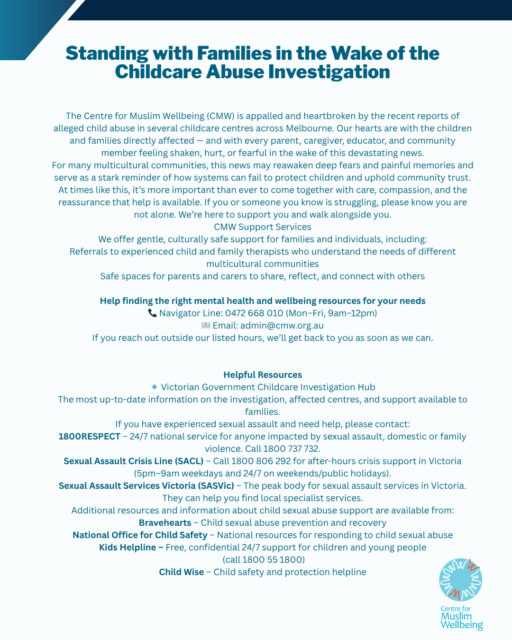You or people in your care have experienced or witnessed a traumatic event. Even though the event may be over, you may now be experiencing or may experience later, some strong emotional or physical reactions. It is very common, in fact quite normal for people to experience emotional aftershocks when they have passed through a horrible event or present events have triggered emotional responses relating to past events.
Sometimes the emotional aftershock (or stress reactions) appears immediately after the traumatic event. Sometimes they may appear a few hours or a few days later. In some case, week or months may pass before the stress reactions appear.
The signs and symptoms of a stress reaction may last a dew days, a few weeks or a few months and occasionally longer, depending on the severity of the traumatic event. With understanding and the support of loved ones, the stress reactions usually pass more quickly. Occasionally the traumatic event is so painful that professional assistance from a counsellor may be necessary. This indicates that the particular traumatic event was just too powerful for the person to manage by himself or herself. Here are some very common signs and symptoms of a stress reaction:
Physical Effects
Nausea
Tremors (lips, hands)
Feeling uncoordinated
Profuse sweating
Diarrhea
Dizziness
Chest pain
Rapid heart beat
Rapid breathing
Increased blood pressure
Muscle aches
Sleep disturbance
Cognitive Effects
Slowed thinking
Difficulty making decisions
Difficulty in problem solving
Confusion
Disorientation (place & time)
Difficulty calculating
Difficulty concentrating
Memory problems
Difficulty naming common objects
Seeing the event over & over
Distressing dreams
Poor attention span
Flashbacks
Can’t get negative thoughts out of your head
Emotional Effects
Anxiety
Fear
Guilt
Grief
Depression
Feeling lost
Feeling abandoned
Anger
Isolated
Worry about others
Wanting to hide
Irritability
Feeling numb
Startled
Effects of Trauma on Children
Disappointments and surprises in our lives change the way we develop. All change can have an emotional effect on us. Change exposes us to new experiences which can make us feel uncomfortable until feelings of competence and security are again established. The adjustment will either be positive (healthy) or negative (unhealthy).
Children are often exposed to change, moving from one grade to the next, winning or losing a game, making new friends, new babies in families, grandparents passing away, moving house, moving schools. With any of these changes, however simple, something is left behind. It is at this point that a certain amount of grief will be felt and the ensuing disappointments are foundations for building coping skills. It is through these life experiences, beginning in our childhood, that we understand, accept and handle our emotional reactions to a crisis.
Within the school, the entire student body changes after experiencing a crisis that involves its own people and or property. If the crisis is handled in a sensitive manner, the classes will bond to form a cohesive school community that relies on and respects itself. If the crisis is tucked away under the rug or only superficially acknowledged, students will have only their own resources on which to rely and they are often inadequate. When these resources do not provide the necessary emotional support for a child, his emotions will erupt into maladaptive behaviour.
AGE SPECIFIC REACTIONS TO LOSS
The above physical, emotional and cognitive reactions mentioned above may apply to some children.
Preschool and Prep age group
It is important for adults to be very clear when communicating with this age group. They are concrete in their thinking and take things literally.
Six to Eight Year Age Group
Fascination with the detail of the event, asking lots of questions to try to understand what happened
Eight to Twelve Year Age Group
Egocentric thinking may encourage children to believe their feelings of not liking school caused the fire.
Teenage Perceptions
Abstract thinking begins at age 12. The teen who has a family or support system with sound values and clear communication, a spiritual or philosophical foundation to draw upon, and the self-esteem generated by personal achievements, will weather this crisis beautifully.
Strategies provided to children and young people to make them feel more comfortable:
Provide an assurance of care
Sensor and limit their exposure to TV and other media about the event, as this may cause vicarious trauma (witnessing the event, or situation or other people dealing with the situation) can cause trauma
Telling of stories (feelings, dreams)
Intellectual Approach (challenging irrational fears and replacing with helpful/ rational thoughts)
Group discussions (explore facts, ideas, emotions, meaning, education about coping strategies, closure)
If you are concerned about your child or begin to notice changes in their behaviour similar to those mentioned above, please feel free to contact the class teacher, counsellor, GP or psychologist for advice.
About the author
Monique Toohey is a registered Psychologist and certified Cultural Intelligence (CQ) Advisor (USA) and has trained staff from over 360 organisations in cultural competence. For 6 years she was the Lead Lecturer of Multicultural Counselling and Culture and Psychology at the Australian Catholic University and is a regular guest lecturer at universities both nationally and internationally. She has also delivered organisational training programs in Turkey, Indonesia, and Malaysia. You can contact her at: https://cmw.org.au/profile/moniquetoohey/







